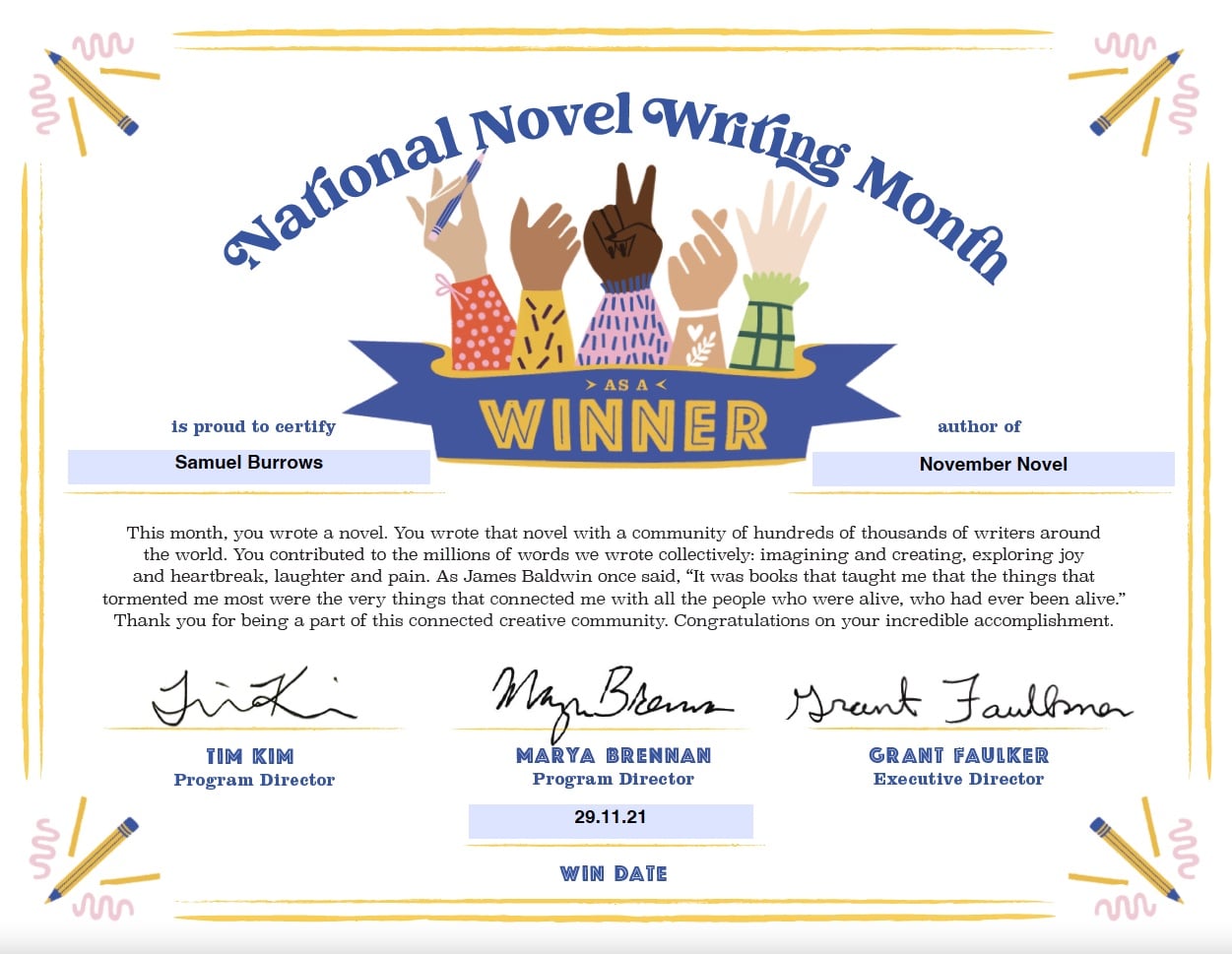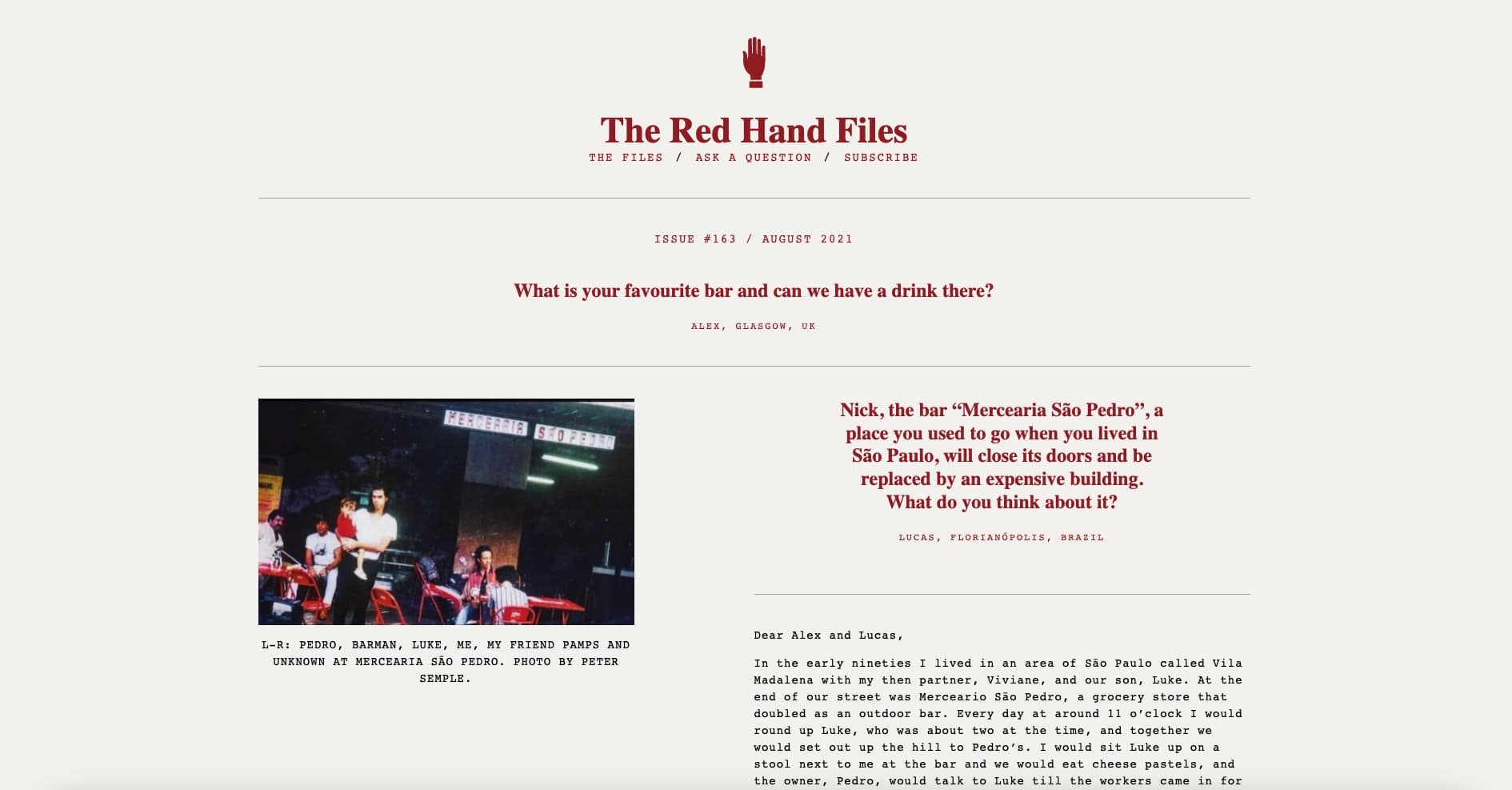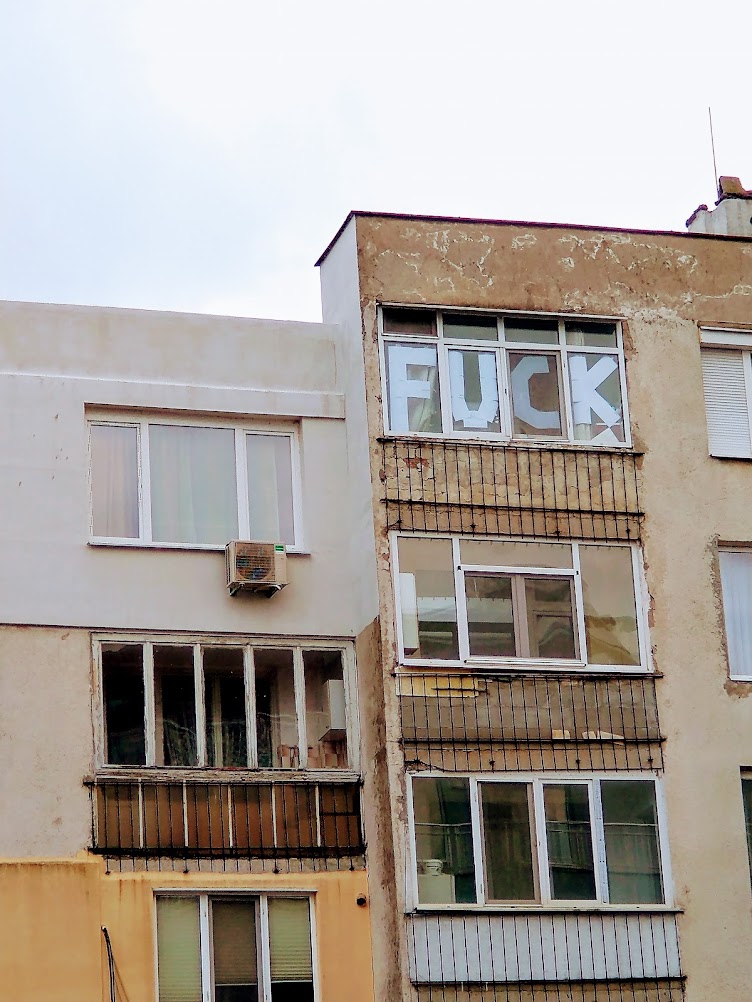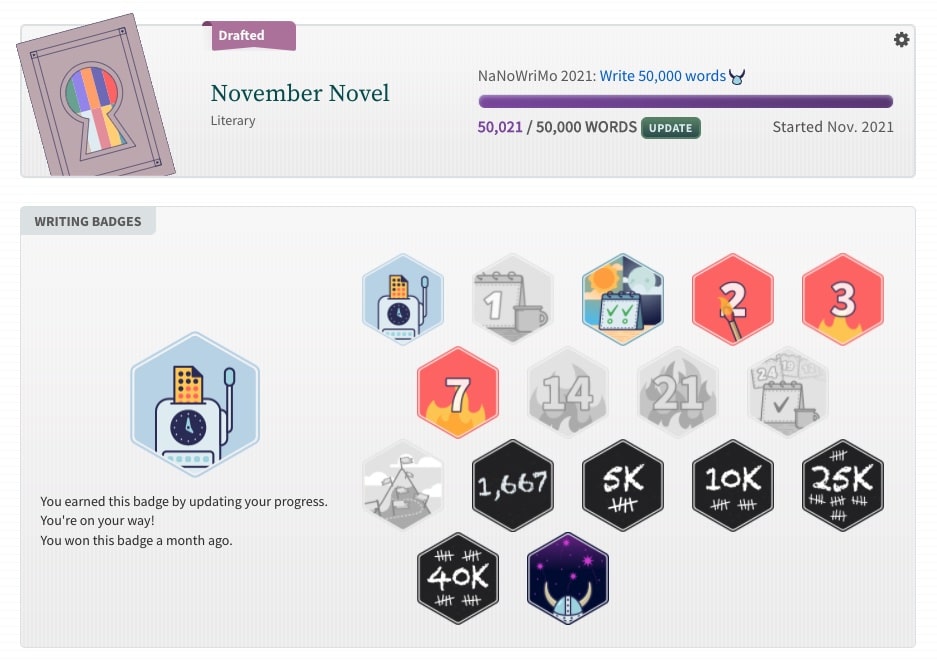
This year, I participated in NaNoWriMo 2021 for the first time. I’ve written around seven novels in my life. However, this experiment was the first time I tried to write an entire book in one month. The good news is that I now have a new 50,000-word novel—my eighth novel, still unnamed. I titled it ‘November Novel’ for the sake of the project, but I’m far from naming it yet. The contents of this post will explain why.
Here’s the thing: I don’t feel as though I’ve written a novel. I feel like I’ve written 50,000 words, but not a novel, because I haven’t spent enough time with my characters. The places and people in my story are shallow versions of what they could be. Yes, I can and will work more on the novel, but I feel like work on my novel will begin with a rewrite. I will start again, using the 50,000 words as skeleton notes, not a first draft.
To me, NaNoWriMo 2021 was about reaching the word count. To help, I invited outside inspiration into my writing. One of my NaNoWriMo 2021 tactics was to write freely about the things I saw when I left the house, trying to find some poetry in my everyday surroundings like the grey and depressing communist blocks of the city, such as in two of the entries you’ll find in this post.
The first chapter I’ll share in this post took inspiration from a very different source: Nick Cave’s interactive blog, The Red Hand Files. One morning, I read one of his entries. I enjoyed it and then wrote a short chapter for my novel. See ISSUE #163 of Nick Cave’s blog here: https://www.theredhandfiles.com/what-is-your-favourite-bar/. Read the post that inspired my story.

Chapters from my NaNoWriMo 2021
Nick Cave’s Merceario São Pedro
It’s something that hardly anyone ever thinks about. Or if they do think about it, they don’t mention it or look as though they’re thinking about it. But one day, all the places we loved hanging out won’t be there anymore – A couple of pine trees we tied our hammock on and slept in the shade on a sweltering day. The entire house we grew up in, where your mother’s cut our hair in the kitchen, and you waited patiently on the chair, your spindly swinging legs still too short for your feet to touch the ground, for her to sweep your childish blonde hair from the tiles to put into the bin on top of the dinner your little sister wouldn’t finish. Hell, even a bar at which we drank.
The places we loved hanging out. One day they’ll be gone, left to the wind and emptied from the inside, leaving a brick shell that you’d consider stepping inside if you saw it, but you wouldn’t. You’d tell yourself it would be unsafe to enter or that you don’t feel like it. But the truth is, you wouldn’t enter because you know you’d cry. No one thinks about these things until they’re gone. But it feels like I’m always thinking about them.
I’ve been reading Nick Cave’s blog, The Red Hand Files. It’s one of the only things I read now. He answers questions from the readers, and one asked him if he knew that the bar he used to visit in São Paulo, a place called Merceario São Pedro that doubled up as a grocery store, had shut down to be replaced by ‘an expensive building.’
Nick Cave responded with an entry on his blog. These words kill me: ‘Those days at São Pedro’s were simple and good. They were the best of times. Now, developers are tearing the bar down and building a luxury apartment block in its place. I understand that this is the way of the world — things come and go — and I know that we are facing more pressing problems than the demolition of a little bar in Sao Paulo, yet even still, a piece of Vila Madalena’s soul will be lost when they rip that place down, and a piece of mine too.’
There’s more to Nick Cave’s entry than that, and you can look it up if you want to. It won’t be hard to find unless the website has been taken down by the time you get around to visiting.
I’ve tied my hammock to a lot of trees, loved a few bars here and there, and I do have memories of feeling impatient while my mother cut my hair in the kitchen and feeling more impatient as I waited for her to sweep the floor before I jumped down from the chair. She didn’t want us running the hair into the carpeted floors. The kitchen and the house are still there. The kitchen is still tiled with the same light blue lily pattern, and the other floors are still carpeted, though new carpets have been laid. And my mother is still alive.
But I’m painfully aware that one day all these things will not be there. I don’t know what you’d call an emotion like that. Presumed nostalgia? Foreshadowed melancholy? Maybe it’s not as unnatural sounding as those. Perhaps it’s just gratitude or the opposite of taking something for granted. I appreciate the people and places in my life so much that I sometimes begin to miss them before they’ve gone. Whatever you call that, I’ve got it.
*

Bedsheets like sails underneath the blocks
I stopped outside one of the blocks, or maybe I should say ‘beneath’ one of the blocks because it was a fifteen-story column that shaded me from the sun. There was a small communal garden with five broken benches for the hundreds of people in the building. There were four climbing frames for the children to play on, implanted on the concrete instead of the grass. Of course, I played on hard ground as a child and survived, but that’s not the point. There was a small patch of thinning grass, but there seemed to be an unspoken understanding between the occupants of the block that the grass was for dog shit, nothing more. And there were two washing lines, laughably long at around 30ft.
I sat on the bench that looked the least broken and watched the wire lines—something from years before came to me. I remember breaking one in my teens by trying to zipline down one, hanging onto a heavy coat hanger. The line broke, and I ran around the corner, first to hide behind the corner of another block and then to another playground. All the feelings were coming back to me. I felt terrible for doing it, stupid for not realising the line would break, and fucking bored out of my little mind. At least no one knew it was me. I heard people talking that afternoon. They said a teenager did it, but no one enquired further than that. It didn’t matter which teenager it was. We were all the same.
I felt guilty about it, and I wanted to apologise to the old man I saw fixing it the following morning, but I didn’t. Maybe it wouldn’t have been such a bad thing to have been caught. I couldn’t have paid for it, but I could have said sorry. The memory had me feeling bad, so I went back to watching the lines. I wouldn’t want my washing out there for everyone to see, especially if my washing looked like theirs. Sad, damaged rags. Clothes that were once bright white were hanging grey. Material that was once dyed vibrant reds, greens, and blue were now tired versions of their former selves, like those old women you see, walking around with dyed red hair, grey roots shooting from their gloomy faces.
I watched the bedsheets, sitting limply on the line. They looked like broken sails, thin and full of holes. But they weren’t sails; they belonged to people in the block, and these people slept on them. And now they were out for everyone to see, vulnerable. They weren’t sails, and they couldn’t take me anywhere. Nothing around here could inspire anything. I looked behind my broken bench, up at the dirty monolith blocking the sun, at the black bars of the balcony cages—dozens of prisons behind, broken sails in front.
*
A view of death from my balcony
A coroner’s car pulled up outside the block opposite mine. I knew it was a coroner because of the writing on the side of the company car. An overweight man parked, got out of the car, and opened the boot. A couple of people left the block. They talked long enough for me to realise they must be family, or at least the ones who called him. The guy opened his boot and pulled the open coffin halfway out, leaning the lower half of it on the road as though it was a ramp from the road to the boot of the car.
The guy went inside with the people, and I watched the strange sight for a while. I watched the waiting coffin even though I knew I didn’t really want to see it. I was halfway through a salad, but I’d stopped eating and knew I probably wouldn’t feel like finishing it. It had been a nice morning. I’d sat outside in the sunshine, drinking coffee and reading. I would have stayed out all day, but I wanted to eat and had plenty of food at home. Too much food to think about buying something outside. But it had been a really nice day. I watched the waiting coffin and knew that, however good the afternoon and evening would be, the day would be marked dead in the middle with this unsettling incident.
I wondered what was taking the guy so long. He had been inside for over ten minutes, just leaving his car and coffin open out on the road. And then the front door to the block opened, and I saw three men struggling with a human-sized sack. It sagged in the middle, almost dragging at the pavement. They heaved the sack into the coffin, said a few words, and then the guy drove off. I watched the pavement and the space for a while. I can’t say how long. But I watched it until a gold car – really, it was as gold as cartoon money – filled the space, and then I looked up and saw an advert for water, with the tagline, ‘Choose to live.’
NaNoWriMo 2021
In summary, I appreciate the incentive that NaNoWriMo 2021 gave me to get writing. For writers looking for an extra push, this is the perfect opportunity. The program recommends a daily word count and keeps you on track with little, encouraging rewards and easy-to-read progress graphics.


Will I try it again next year? Possibly. But I’ll approach it much differently next time. I might only attempt to write an outline of a story. For my style of writing, it doesn’t sense to complete the first draft within one month. My characters need room to breathe, and I need time to reflect on what I’ve written and doubt myself now and again.
I don’t wish to overly criticize the challenge. Overall, NaNoWriMo 2021 was a worthwhile experiment, but I fear it teaches bad practices. Writers shouldn’t rush. I implore writers to participate in the program but never attempt to complete their novel within the slim timeframe. Writing isn’t enough. Write well! For the sake of your readers, never rush.
